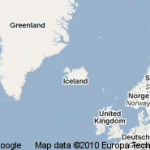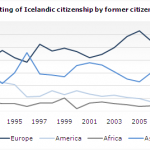 Last week Iceland made history by becoming the first European nation to abolish strip clubs — made effective by passing a law that makes it illegal to profit from the nudity of employees. The law will take effect on July 1, 2010. What is perhaps even more unusual on a global scale is this law is being reported as a NOT a result of religious, but of feminist influence. Julie Bindel in Guardian UK writes:
Last week Iceland made history by becoming the first European nation to abolish strip clubs — made effective by passing a law that makes it illegal to profit from the nudity of employees. The law will take effect on July 1, 2010. What is perhaps even more unusual on a global scale is this law is being reported as a NOT a result of religious, but of feminist influence. Julie Bindel in Guardian UK writes:
Kolbrún Halldórsdóttir, the politician who first proposed the ban, firmly told the national press on Wednesday: “It is not acceptable that women or people in general are a product to be sold.”
Bindel continues:
According to Icelandic police, 100 foreign women travel to the country annually to work in strip clubs. It is unclear whether the women are trafficked, but feminists say it is telling that as the stripping industry has grown, the number of Icelandic women wishing to work in it has not.
This news (all of it: that strip clubs will be banned and that mostly foreign women work in those clubs) came as a surprise to many including me. But then again, my only experience of that country comes from a short layover in Reykjavik a few years ago on my way to Oslo. From my window airplane seat I looked down on a landscape unlike any I’d ever before witnessed, a fascinating result of glaciers, earthquakes, and volcanic eruptions. At the Reykjavik airport in my jetlagged state, I looked for Bjork and wondered if perhaps the plane had mistakenly landed on the moon.

Now that Iceland is back on my radar (and I’m not currently jetlagged), I thought it would be a good time to take a better look and to investigate how and why strip clubs are being banned on this North Atlantic island. Bindel’s Guardian UK article credits the triumph of feminism, calling Iceland “the world’s most feminist country.” I’m intrigued by what does appear to be a very strong showing of feminist abolitionist (anti-sex work) sexual politics. But I’m also curious about how the demographic context — including the sex and race/ethnicity of migrant laborers — may be influencing this current abolitionist stance.
First, a look at indicators of gender equality in Iceland. According to the 2007 Global Gender Gap Index (published by the World Economic Forum), Iceland ranks fourth in the world in providing equal economic, political, and health standards for women and men. The current prime minister of Iceland is a lesbian woman, the world’s first openly gay leader.

For some feminist commentators these cultural and structural factors explain how strip clubs became ousted from Iceland. After all, aren’t all feminists and lesbians opposed to the commercial sex industry?
Because the answer to this question above is “no,” I’ll move to another line of inquiry: Might other, demographic, variables also be encouraging this abolitionist stance?
Let’s look at who lives in Iceland. According to Statistics Iceland, the population of Iceland has decreased for the first time since 1889:
On 1 January 2010 the population was 317,630, compared with 319,368 1 January 2009. The population decrease is due to a record negative net migration in 2009, while the natural increase (births less deaths) was 1%.
In other words, people are leaving Iceland, and those who are staying aren’t having many babies. The TOTAL population of Iceland is LESS than the population of most major US cities, and comparable to the population of many Carribbean and South Pacific islands (see list of world populations by country here). The vast majority of people in Iceland live in the Reykjavik area (120,000 in the city proper.)
(Side note: Reykajavik is a small town. It’s not usually a good idea to work as a stripper in the same small town where you grew up. Things quickly get uncomfortable when your brother, uncle, friend, former coach, and dad show up. If you are an Icelandic woman who wants to be a stripper, go elsewhere!)
Given Iceland’s decreasing population, it makes sense that immigrant workers may be needed in many occupational sectors. Indeed, there has been an increase in citizenship granted to immigrants:
“The largest number of those who are granted Icelandic citizenship come from Europe. In 2009 the majority of those originated from Poland (153) and Serbia (76). Asians are the second largest group, with 106 who had formerly a Philippine citizenship and 51 Vietnamese.” (Statistics Iceland).

This pattern of immigration from Europe and Asia is not new, at least within the past few decades. As seen in the graph to the right, since 1991 there have been relatively stable (and low) patterns of immigration from Europe, Asia, the US and Africa. What has changed however since 2001 is an increase of immigrants from Europe.
It is interesting that in the news coverage of the strip club ban (which has mostly replicated the Guardian UK article quoted above), the topic of “trafficking” is mentioned. What is curious is that there does not appear to be any direct evidence for women being trafficked (forced) in to Iceland to work in strip clubs. If there is, it’s not being reported. Instead, readers are left with comments such as Julie Bindel, who writes:
“I have visited a strip club in Reykjavik and observed the women. None of them looked happy in their work.”
Not exactly reliable evidence of trafficking.
And so I am left once again with the suspicion that this ban isn’t about protecting workers from being trafficked. It’s about the tensions that arise over immigration; it’s about a conflict over the meaning(s) and use(s) of sexuality; it’s about not recognizing sex work as labor, and hence not assuming that sex workers deserve basic labor rights. It’s also about a lack of reliable research which, at minimum, investigates the experiences of people in the industry. Visiting a strip club and thinking that people don’t “look happy” doesn’t count.
Some people, the majority perhaps, cannot imagine ever choosing to be a sex worker. Since they cannot imagine it, they assume that they must be forced into it (and thus either must be saved or punished). Some people also believe this about gay people. It is no coincidence that the GLBT movement has long fought for freedom from arrogant attempts to “save” and/or punish them. Thus I find it more ironic than understandable that a lesbian Prime Minister has decided to outlaw the sexual and occupational choices of others.
—
For more reading about the misdirected politics of anti-trafficking and anti-sex work policies, see Laura Austin’s recent article on the South Africa preparing for the World Cup.

Comments 9
Clarisse Thorn — April 3, 2010
Thus I find it more ironic than understandable that a lesbian Prime Minister has decided to outlaw the sexual and occupational choices of others.
It's interesting how a large portion of the modern LGBT movement has chosen to separate itself from more "radical" sexual movements. It's a funny tension: so many modern gay folks just want to be normal -- and they can, as long as they reject the more extreme banner-bearers of sexual freedom who helped pave their way. Certainly in my generation, I'd say that even the majority of GLBT folks who are out of the closet would never even consider that they might ally with sex workers, BDSMers, etc. (Of course, the ones I tend to associate with are the ones who think that approach is problematic, that gay marriage is a ridiculous self-indulgent privileged waste of time, etc.)
Also, I heart Laura Agustín.
Kari Lerum — April 4, 2010
Clarisse, thanks for your comment. Isn't it interesting that folks in your "generation" would neither be likely to ally with the sexual margins (sex workers, BDSMers) NOR with the sexual center (marriage)?
Clarisse Thorn — April 4, 2010
Well, fortunately, I think there's been a huge groundswell of support for the philosophy of "everyone's different!" as opposed to "we need to center our values around one specific practice, eg marriage". And thank God, because that facilitates not only my own kind of activism (sex-positive, pro-BDSM) but also starts creating community around "live and let live" groups like the larger sex-positive community, which seems to be establishing a stronger presence than ever before. I mean, correct me if I'm wrong, but I believe that there are now 3 or 4 national pro-sex centers that didn't exist 5 years ago? Two of which started within the last year? And politically-minded pro-sex community sites such as SexGenderBody and CarnalNation seem to be gaining ground too.
Global Feminist Link Love March 29-April 4 « Gender Across Borders — April 5, 2010
[...] Iceland’s Abolutionist Stance (Sexuality and Society) “And so I am left once again with the suspicion that this ban isn’t about protecting workers from being trafficked. It’s about the tensions that arise over immigration; it’s about a conflict over the meaning(s) and use(s) of sexuality; it’s about not recognizing sex work as labor, and hence not assuming that sex workers deserve basic labor rights.” [...]
Sally — April 8, 2010
"Side note: Reykajavik is a small town. It’s not usually a good idea to work as a stripper in the same small town where you grew up. Things quickly get uncomfortable when your brother, uncle, friend, former coach, and dad show up. If you are an Icelandic woman who wants to be a stripper, go elsewhere!"
What? Do you honestly think this is a factor? Have you ever spoken to any strippers/sex workers? They have homes, friends and families just like everyone else. Your "suggestion" that 1) it either makes sense for them to leave Iceland to strip, or that 2)this factor explains why strippers in Iceland are immigrants is incredibly simplistic and ignorant. Why would you even put that comment in this article?
Kari Lerum — April 8, 2010
Sally, I am surprised by your comment only because this was certainly not my intention to imply that strippers aren't people like everyone else with friends, families, homes, etc. My apologies if that's what it looked like. I have indeed spoken with and worked with many strippers and other sex workers over the course of the last 15 years (my masters thesis was on the politics of sex work, my dissertation was based in part on ethnographic work in a strip club, and I worked briefly as a dancer in Las Vegas). I was writing from my own experience as well as others' in navigating small town networks, and I was simply attempting to think through some possibilities of why Icelander women aren't working in these clubs.
mcnet002 — April 16, 2010
Sex work is going to occur whether it is legal or not. I think it is better to legalize strip clubs and prostitution so it can be effectively regulated. This will make it safer for women and men who choose to participate.
Lily — May 11, 2010
While I believe it is important to examine issues from all perspectives, I was offended by the final statement:
"Thus I find it more ironic than understandable that a lesbian Prime Minister has decided to outlaw the sexual and occupational choices of others."
I am astounded that you made a comparison between being lesbian to choosing to be a stripper. As a straight woman, I do not feel it is my choice to be straight. Nor to I believe that the Prime Minister of Iceland chose to be lesbian. Thus I feel that comparing one's sexual orientation to the choice to work at a strip club to be entirely inappropriate. While I understand that not all individuals hold this opinion, I found your closing comment to be offensive.
While I feel like it is a personal choice to view what general society perceives to be sexually explicit material (pornography, strippers), I believe the reasoning in creating this legislation to prevent women from being "a product to be sold" to be valid.